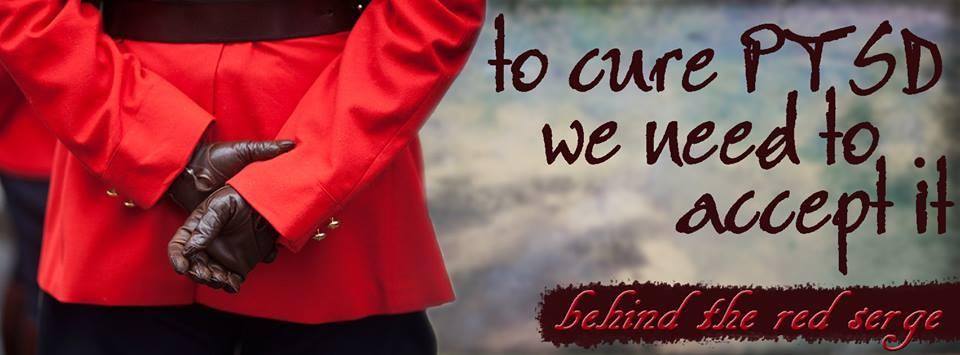Over the last few years of running Behind the Red Serge,I have been both disappointed and amazed. Change is happening slowly…
When I first set out it was really a move of a desperate woman who felt like she was drowning. I was losing my husband, my best friend to an invisible enemy. He became distant, angry and cold. Some days I could see the man I married waging a war inside his head, desperately trying to surface. I KNEW something was wrong but when I reached out to others many laughed and told me its a part of the job. He just needs to MOUNTIE UP! Now I know my husband, he is a strong man and if he could have Mountie’d up he would have.
Slowly very slowly this attitude is shifting, I have to admit NOT fast enough, however I am going to look at the positive…its shifting. I believe this is due to people, people like you and I , who refuse to be quiet, who refuse to be embarrassed. My husband was not weak, or lazy or any of the other hateful things thought of PTSD. He was injured. He went to work, did his job and was not adequately prepared or trained to keep his mind healthy.
PTSD is an operational stress injury. It floors me and continues to disappoint me that many people especially in leadership positions refuse to see what can be done in this area to be PROACTIVE.
Simple steps as providing the following;
1-TRAINING at DEPOT
Members are trained in many different ways to keep themselves physically safe yet mentally they are not prepared. The have classes to understand their benefits, yet no one discusses what to do IF they start exhibiting the signs & symptoms of an operational stress injury. My husband went through a long time ago, so I am depending on the information I have received from others but to my knowledge this has not changed dramatically
2-Debriefs after critical incidents.
Now some will say this happens…I can tell you for absolute fact it does NOT always happen. 1-Staffing shortages of properly trained people is a huge issue, 2- there are some areas, regardless what the common person wants to believe, that have many critical incidents in a week, or month. However this is something that must be made a priority
3- EXIT interviews once transferred out of high risk areas. My husband was transferred to a new detachment before it was evident he was injured. He was in a new detachment, with new management who had no idea who he was. They did not know his work ethic nor his personality to see that he was declining. The saw a member that was not performing, and that was it. It amazes me to this day that there was an assumption that he was just useless instead of a senior member with vast experience that was injured. He came from an area that is VERY well know to management, an area that has a very high percentage of members being diagnosed with PTSD…yet it continues to come as a surprise to leadership…..
4-ONGOING TRAINING– There are courses that are already developed and running. Psychological First aid is a perfect example, not only would this training benefit the members in recognizing signs & symptoms in themselves and colleagues, it would actually assist them in doing there job with the public. They would have the skills to work with and deescalate PEOPLE with mental health concerns!
ASK the members. There are members who have been diagnosed with operational stress injuries that have successfully stayed at work or returned to work. TALK TO THEM! What worked, what resources were they provided? What areas do THEY feel were lacking in their journey?
ASK the spouses! I am not a member, I am not a police officer nor do I work in the first responder field in any way. I don’t work for the RCMP. I realize that a lot of jobs do not recognize spouses. However, in this career, there is a lot of expectation put on spouses and families. Although we are not the ones that signed up for this we support our loved ones in this career. We move, we often live far from our family support systems and in some cases in isolation. We are the ones that often are the first to recognize a change in our spouse. We need to know what to expect. At depot they take us all into a room and discuss the effects of shift work yet they do not provide information about PTSD.
These are simple suggestions to me. I don’t understand why it seems so complicated. There is a growing concern in regards to operational stress injuries in this field of work. People have lost their careers, their families and in some cases their lives. The RCMP leadership can not hide their collective heads in the sand. We publicly mourn the loss of officers killed in the line of duty yet as a society we remain quiet on the sidelines when these officers suffer from operational stress injuries.
Thank you to all the brave members, their spouses and colleagues who are standing up and saying THIS IS NOT OK! We do not have to do this alone! Together we are stronger! KNow the signs and symptoms-watch out for each other

WELL SAID and well supported by this spouse loving her PTSD hubby!!:) . . . united we are standing!! . . . 🙂
LikeLiked by 1 person
Very well written. Thank you for putting our thoughts into words
LikeLike